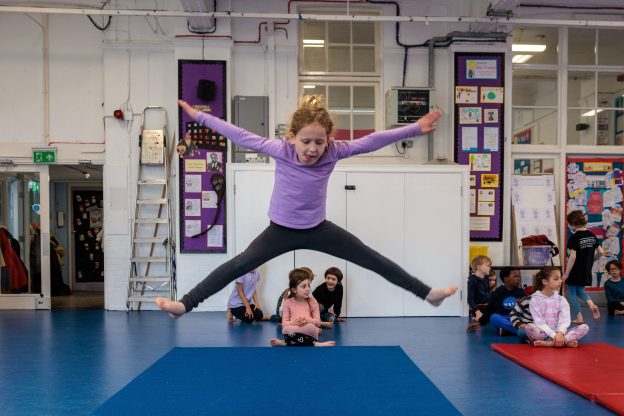Address:
William Patten Primary School
Stoke Newington Church Street
London N16 0NX
Office Manager: Rita Quigley
SENDCo: Caitlin Shaw
William Patten Primary School
Stoke Newington Church Street
London N16 0NX
Office Manager: Rita Quigley
SENDCo: Caitlin Shaw

Intent
William Patten Primary School recognises the value of Physical Education (P.E). We fully adhere to the aims of the national curriculum for physical education to ensure that all pupils:
Implementation
P.E. is taught at William Patten Primary School as an area of learning in its own right, as well as being integrated where possible with other curriculum areas. It is taught at a minimum of one PE session a week, and two sessions per week wherever possible.
The key knowledge and skills of each topic are mapped across each year group. This ensures that children develop their knowledge of games, dance and gymnastics and (from KS2) athletics and outdoor and adventurous activity progressively. The skills in these areas are also therefore developed systematically, with the programme of study for each year group building on previous learning and preparing for subsequent years. Knowledge and skills are informed and linked to enable achievement of key stage end points, as informed by the 2014 National Curriculum.
We teach lessons so that children:
Each new unit of work begins with a recap of the previous related knowledge from previous years. This helps children to retrieve what they have learnt in the earlier sequence of the programme of study, and ensures that new knowledge is taught in the context of previous learning to promote a shift in long term memory. Key vocabulary for the new topic is also introduced as part of this ‘unit introduction’ and children are shown the ‘Topic Vocabulary (TV) Mat. This provides definitions and accompanying visuals for each word to ensure accessibility to all. This approach also means that children are able to understand the new vocabulary when it is used in teaching and learning activities and apply it themselves within the context of physical activity.
The KWL process is used throughout each unit of work. Once children know the new vocabulary for the unit and how it relates to previous learning, the children are asked what they already know specifically about the new topic. This provides the teacher with an insight into the children’s ‘starting points’ for the topic, to enable the use of assessment to inform planning. The children are then also asked what they would like to know and class responses are collated and used to inform the programme of study to ensure an aspect of ‘focussed interest planning’. A record of this process, including photographs of the children demonstrating key skills, kept in children’s PE floor books. At the end of the topic, children take part in a review of what they now know and can do. The teacher is then able consolidate any of the key knowledge which is identified at this part of the process as not yet being secure.
Lessons are planned to utilise cross curricular links, as well as the context of the school (including school and local grounds and access to facilities and community role models, such as sports coaches, with specialist skills). The varied curriculum is designed to enable all children to enjoy physical activity and to experience success in sport. An extensive extra-curricular provision also provides further challenge and access to a range of physical activity. All children have the opportunity to participate in PE at their own level of development, with teachers ensuring that lessons cater for individual needs. As well as securing and building on a range of skills, children develop knowledge of the basic rules of a range of games and activities. They experience positive competition and a strong focus is placed on developing good sporting attitudes. Children learn in a safe environment and have a foundation for lifelong physical activity, leaving primary school as physically active.
Impact
The children complete each key stage with a high proficiency in each aspect of PE. Children are aware of the link between physical activity and good mental health and understand its significance as part of a healthy lifestyle. The school achieves well in a number of sporting activities and achieved an active school award at bronze level in 2018-19 (award not available in 2019/20) in recognition of its PE provision and children’s access to competitive sports, which the school has maintained. Regular gymnastics performances showcase the considerable achievement that children make in this area, in each year group and the impact of the school’s work with external agencies also demonstrates the positive impact of the PE curriculum: William Patten ‘Dancers in Residence’ | New Adventures (new-adventures.net)